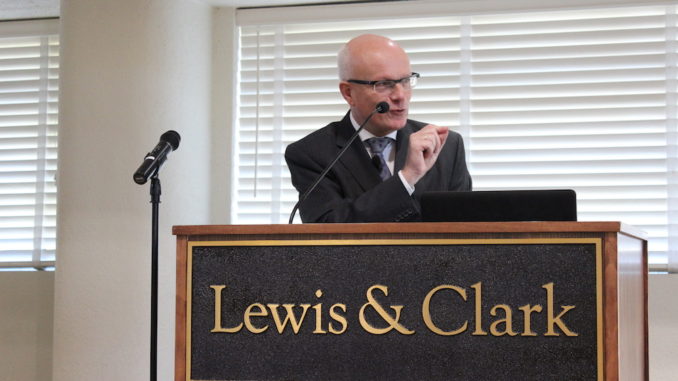
By Anna DeSmet
Belgian Ambassador Dirk Wouters gave a presentation entitled “Brexit, the EU and the US: An Example of De-Globalization” to Lewis & Clark students and community members on Oct. 27.
“The somewhat mysterious title of my presentation originated from a conversation with some of my friends,” Wouters said. “We were trying to answer the question … How would future historians and history books look back on the present-day that is so, let’s say, disturbing?”
On June 23, 2016, the U.K. voted to leave the European Union, an organization 28 countries strong. It was a narrow margin: 52 percent voted for leaving the EU while 48 percent voted to remain, with 65 percent voter turnout. Wouters’ presentation focused on the history leading up to this event, commonly referred to as Brexit, and the potential consequences for the U.K. and the world, as well as the steps that the international community takes after such an event.
“The talk, which discussed Brexit in the context of more widespread political movements, was extremely timely and extremely well received,” Bruce Suttmeier, Interim Dean of the College of Arts and Sciences, said. “The Ambassador, with his deep experience at the EU and elsewhere, had a great deal of insight to share with the students and the rest of us.”
Wouters’ has decades of political experience; the Embassy of Belgium reports that Wouters joined the Belgian Ministry of Foreign Affairs in 1980.
“The Belgian ambassador was very knowledgeable and explained the whole situation very well with Britain and the coming negotiations,” Connor Ayers ’20 said.
“We were lucky enough to have a connection to Ambassador Wouters through Life Trustee and great friend of the College, John Bates,” Suttmeier said. “(Wouters’) work seemed an ideal fit with the College’s exceptional (International Affairs) department and Overseas Programs office.”
Wouters believes Brexit occurred in part because the U.K. has “always been a unique and exceptional member of the European Union.” It has not always been a member of the EU; it joined 21 years after the EU’s formation.
The U.K. has also negotiated the greatest number of exceptions for itself to the common law of the EU. For example, it is not a part of the Justice and Home Affairs Council.
Historically, the U.K. government has been hesitant to become more closely entwined with the rest of the European continent because the U.K. economy has performed better than the economies of the other countries involved.
Wouters explained how we will not be able to guess the full extent of those consequences until March 29, 2019, the deadline for negotiations for the Withdrawal Agreement, to come to a close and the U.K. officially leaves the EU.
The U.K. is a powerful member of the EU, with one of the biggest European armies and the fifth largest economy in the world. The U.K. is also a large contributor to international aid and development.
“The U.K. is one of the most important contributors to humanitarian aid and development corporations in the world,” Wouters said.
Leaving the EU might have an affect on the U.K.’s trade flows. Forty-seven percent of their trade is with EU member states, amounting to 7.2 percent of their GDP. In the 10 days following Brexit, there was a 10 percent depreciation of the pound. International Monetary Fund worsened the U.K. economic forecast.
“There will be an economic impact,” Wouters said.
Brexit also created divides within the country itself: regionally, between London and the rest of England, and between the younger generations and the older generations.
Brexit will also affect the U.S. It might mean a new trade deal between the U.K. and the U.S.
“But if I can go into a personal comment here,” Wouters said. “Good luck, good luck, good luck.”
Little more than 30 percent of the population made this monumental decision.
“The worst thing is that if the young people, 16 and 17 years old … would have been allowed to vote in (the EU) referendum, then the results would have been different,” Wouters said.
Subscribe to the Mossy Log Newsletter
Stay up to date with the goings-on at Lewis & Clark! Get the top stories or your favorite section delivered to your inbox whenever we release a new issue.

Leave a Reply